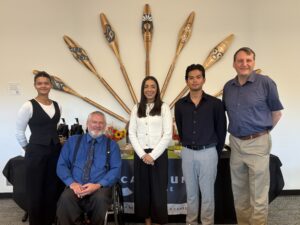Minister of post-secondary education and future skills Jessie Sunner visited Camosun College on Wednesday, September 17, with a clear message: British Columbia must “stand on our own two feet.” She repeatedly returned to this theme of self-reliance during her interview with Nexus, calling it “crucial to our ability as a province to move forward” amid a record $11.6-billion provincial deficit this year and a larger $12.6-billion shortfall projected next year.
Sunner, who was appointed to the position in July of this year, acknowledges that colleges like Camosun have been hit with “double the impact”—federal cuts to international-student permits reduce a major revenue source and student body diversity at the same time as broader fiscal pressures make replacement funding harder to secure.
Colleges have been hit disproportionately, forcing Camosun to reduce course offerings and threatening programs that serve some of the province’s most vulnerable learners—mature and returning students, students with disabilities, and students seeking an affordable path to higher education.

Sunner calls the federal cuts “unilateral” and acknowledges that they have “impacted institutions across our province.” She connects this crisis to her broader vision for provincial independence, emphasizing education’s role in its economy.
“Education is fundamental. That is something that the province absolutely recognizes,” says Sunner. “Especially at a time right now when we are needing to secure our sovereignty and make sure that we are building and doing things right here in BC, it’s even more important.”
In the ’90s, institutions were 80 percent funded by the government. Since 2011, under premier Christy Clark, the funding model has relied heavily on international-student money—a divestment that has dropped provincial funding to 41.1 percent.
International students, she admits, “were helping subsidize a lot of the education.” The province is pushing Ottawa to include BC in decisions about international education and immigration more broadly, arguing that the province knows where skills are most needed.
“We’re working with post-secondary institutions to help them mitigate the impacts—mitigate impacts on students, on staff, on faculty, and see the way forward, because, ultimately, we know there’s challenges in this sector and we need to make sure that we are working together to get to a place of sustainability,” she says, “where we as a province can sustain our post-secondary institutions in a way where we’re not so exposed to impacts and decisions made by either other levels of government [or] also other countries.”
Mental-health services, disability supports, and programs for adult learners—services that define Camosun’s accessibility mission—remain at risk as the college works within constrained budgets to offset significant revenue losses. For students who choose Camosun because of its accessibility and supports, that leaves little certainty about what will be available next semester.
“These are all things that are very important, not just at Camosun—across institutions, across the province. They’re really important in supporting the student experience, which is at the core of the work that we do,” says Sunner. “It goes to the boards, it’s on [them] to make the decision with the funding that they receive, but I think it’s important to know that those services that students need and rely on are important services that are important to have an eye to, but it really is on the institutions to make those decisions and make sure that they’re supporting students in the best way possible.”
With the rising cost of housing impacting post-secondary students, at Camosun, the province has committed to investing in affordable student housing. Now in progress, a 429-bed residence will be built on the Lansdowne campus.
“We’ve just recently opened 467 [beds] at BCIT. We have a student housing project with a similar number of seats here at Camosun that’s coming soon,” says Sunner. “Investing in student housing helps provide close access, affordable places where students have laundry service, food service, all of these things to help take other pressures off of students… We’ll continue to work with institutions and invest in the student experience where we can.”
When asked how the provincial deficit will impact post-secondary education, Sunner points to the current political conditions, mentioning the uncertainty of the US tariffs.
“This just touches on exactly what we talked about in terms of the fiscal headwinds that we faced,” she says. “We don’t know what’s happening down south… and where that could go—it really has impacted the financial situation of our province.”
Despite these constraints, Sunner reiterates that post-secondary education is essential.
“At the core of our government, it’s ensuring that the services that folks need… are always there. Post-secondary is crucial to our ability as a province to move forward and to be sovereign, and to make sure we can stand on our own two feet and train our own workforce.”
But for emergency funding, service protection, and program stability, Camosun students must wait to see whether Sunner’s understanding of their challenges leads to specific action they can count on by next semester.
“We’re here to support you,” says Sunner. “You are the future of this province, and we are so lucky to have the talent, which is our people right here in our province.”

